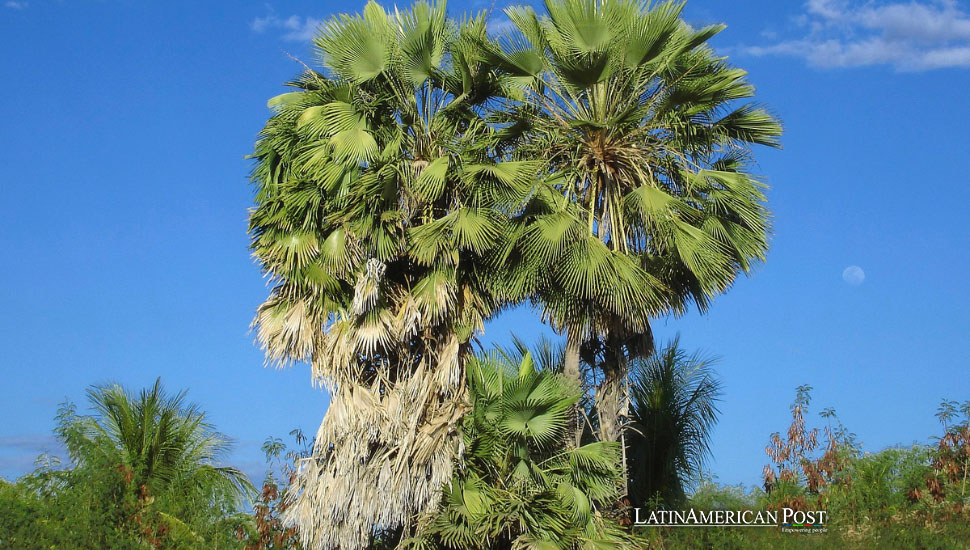Carnauba’s Curse: Unveiling Labor Exploitation in Brazil

Discover the hidden toll of carnauba wax production in Brazil’s Piauí, where labor exploitation shadows a booming industry. This deep dive explores Latin America’s battle against modern slavery, highlighting a global demand’s local impact and the struggle for workers’ rights.
Carnauba wax, a seemingly obscure product, permeates our daily lives, glossing everything from candies and pharmaceuticals to beauty essentials like lipstick and mascara. Yet, behind its sheen lies the harsh reality of labor exploitation in Brazil’s northeastern state of Piauí, the epicenter of carnauba production. This feature explores the dark side of carnauba wax harvesting and its broader implications across Latin America, unmasking the struggles of those who toil under the sun to supply a global market.
Sustaining Livelihoods Amid Exploitation
In Piauí, the stark, sunbaked landscape of the Caatinga biome is home to the carnauba palm, the source of this sought-after wax. Here, the industry sustains the livelihoods of numerous workers, but not without cost. The power dynamics heavily favor big businesses, with local authorities disregarding rampant exploitation.
A convoy of cars traverses the arid terrain, signaling a raid led by labor ministry inspectors, federal police, and prosecutors. This action culminates months of undercover investigations into the carnauba sector’s working conditions. Gislene Melo dos Santos Stacholski is at the helm, a veteran combating labor akin to slavery in Brazil. Carnauba plantations, notorious for their grueling work environment, dominate her efforts.
Exploitation Unveiled
The industry is rife with issues, as evidenced by the increasing number of workers rescued from these plantations. In Brazil, slavery encompasses forced labor, debt bondage, degrading work conditions, and excessively long hours jeopardizing health. The International Labour Organization links such conditions to rural poverty, a pervasive issue in regions like Piauí.
BBC reporters recently journeyed to a workers’ accommodation block to reveal the grim living conditions: cramped spaces, crumbling infrastructure, and inadequate sanitation. Nearby, laborers seek refuge under a tree, escaping the relentless sun. Most are informally employed, paid meagerly, and endure brutal working conditions, epitomizing the exploitation at the heart of the carnauba wax industry.
The discovery of workers using an old medicine bottle for water and consuming scant meals accentuates their plight. They harvest the wax with primitive tools, scaling the thorny carnauba palms without proper safety gear, a testament to their desperation and neglect.
Edmilson da Silva Montes, a plantation owner found during the raid, epitomizes the industry’s challenges. Despite previous violations, he claims to struggle against the economic pressures of wax production. The authorities’ fines for numerous infractions, including employing slave-like labor conditions, highlight the systemic issues within the sector.
This narrative is not unique to Piauí but resonates across Latin America, where similar patterns of exploitation are mirrored in various industries. From Mexico’s agricultural fields to Chile’s mining sectors, the exploitation narrative persists, often underreported and overlooked.
Towards Sustainable Solutions: Ethical Stewardship and Solidarity
In 2016, Brazilian authorities demanded major wax processors commit to ethical supply chains to curb exploitation. Despite such efforts, the link between small producers and large companies must be more precise, complicating accountability. Even with international clients like L’Óreal pledging ethical sourcing, the profoundly ingrained informality and exploitation challenge the integrity of these commitments.
The carnauba wax story is a microcosm of a more significant issue plaguing Latin America: the struggle against labor exploitation in the face of global demand. While countries like Brazil have made strides in recognizing and addressing these challenges, the battle is far from over.
As we delve deeper into the carnauba wax industry’s complexities, we uncover the exploitation of workers and the environmental and ethical ramifications of unchecked industrial growth. The narrative extends beyond Brazil’s borders, reflecting a region-wide struggle against economic disparities and labor injustices.
This investigation into carnauba wax production in Latin America sheds light on the darker facets of globalization, where the pursuit of profit often overshadows the dignity and well-being of workers. As the world increasingly scrutinizes its consumption’s origins and ethics, the carnauba wax’s story serves as a poignant reminder of the hidden human costs embedded in everyday products.
The journey through the heat-scorched plantations of Piauí is more than a tale of exploitation; it’s a call to action for better governance, corporate responsibility, and international solidarity to ensure that the bounty of Latin America’s lands does not come at the expense of its people’s rights and welfare.
The saga of Carnauba Wax in Latin America is not just about labor exploitation but also about the resilience of communities fighting for justice and dignity. It underscores the need for a concerted effort to forge a future where economic development is inclusive and respectful of both human rights and environmental sustainability. The carnauba wax industry, emblematic of more significant systemic issues, demands a comprehensive approach that addresses the root causes of exploitation while fostering sustainable growth. As the narrative unfolds, it is imperative for stakeholders at all levels—local, national, and international—to collaborate in crafting solutions that uphold the dignity of workers and ensure the ethical stewardship of natural resources.
Also read: Brazil’s B3 Pioneers Bitcoin Futures in Latin America
In the broader context of Latin America, the plight of the carnauba workers in Piauí serves as a crucial lesson in the interconnectedness of local labor practices and global supply chains. It highlights the urgent need for transparency, accountability, and ethical practices in regional industries. By confronting these challenges head-on, Latin America can pave the way for a future where economic prosperity and social justice go hand in hand, ensuring that no worker must endure the harsh conditions in the carnauba palm plantations.
Ultimately, the carnauba wax saga is a poignant reminder of the ongoing struggles and aspirations of countless workers in Latin America who strive for a fair and equitable world. Their journey, marked by hardship yet driven by hope, inspires a global movement towards a more just and sustainable future for all.





